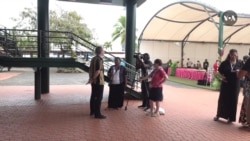The significant legal and economic obstacles standing in the way of press freedom for journalists in the Pacific Islands.
Welcome to VOA Asia Weekly. I'm Chris Casquejo in Washington. That story is just ahead, but first, making headlines:
Families of drug war victims in the Philippines attended a burial ceremony after the International Criminal Court arrested former Philippine leader Rodrigo Duterte in Manila on charges related to his deadly anti-drug crackdown that killed thousands. They say his arrest helps them heal.
“The justice that we want for those who have died is slowly moving forward.”
Duterte says he was "responsible" and pledged to protect police and the military, as he arrived in the Netherlands to face the International Criminal Court case. He made the statement in a video posted on a close advisor’s social media account Wednesday.
Police arrested protesters outside the Chinese embassy in New Delhi on Monday during the 66th Tibetan National Uprising Day. Activists waved banners and Tibetan flags before being detained. The 1959 uprising led to the Dalai Lama's exile in India.
China says it will take all necessary measures to protect its rights and interests after U.S. President Donald Trump’s 25 percent tariffs on all metal and aluminum imports into the U.S. took effect. Trump emphasized that the tariffs must be reciprocal.
North Korea fired multiple ballistic missiles into the Yellow Sea after South Korea began joint military drills with the U.S., the first major combined training of U.S. President Donald Trump’s second term. A South Korean military official said this marks North Korea’s fifth missile launch of the year.
Across Pacific Island nations, journalists are pushing back on draconian laws and defamation cases and weighing the cost of Chinese economic help against true editorial freedom. VOA’s Jessica Stone has the story.
Celebration in December 2022. After more than a decade under a restrictive media law, a vote for change in the Pacific island of Fiji. Newly elected Prime Minister Sitiveni Rabuka:
"I’d like to thank the people of Fiji and congratulate them.”
The Rabuka government repealed a law that allowed the fining and jailing of journalists for up to two years for publishing stories considered against the national interest.
“The prime minister and the ministers, more or less, do not have any issues with answering questions.”
Regional journalists rated Fiji’s press freedoms in the top five of 14 nations surveyed for the first-ever Pacific Islands Media Freedom Index.
“This is just the first step for a better media for our Pacific people.”
The island nation of Palau took the top spot in the index. Leilani Reklai is vice president of the Pacific Islands News Association and publisher of the Island Times.
“The journalists are protected specifically under the Constitution. And we also have laws that are in place to support the media.”
But those protections are being tested. Reklai is named in a defamation lawsuit brought by a company owned by the father of Palau’s president for what the company says are “false and unsubstantiated allegations" about tax payments. Reklai believes the lawsuit is sending a message beyond the Island Times.
“It serves to have the journalists think twice before they print anything or [before] they express what they feel is the story that's going on.”
Defamation lawsuits are also prevalent in the Pacific island of Tonga. Melino Maka, a commentator at the Tonga Independent, knows of many journalists entangled in them.
Maka says these lawsuits exploit another vulnerability of the media here: a lack of funding. He says outlets sometimes resort to asking the Tongan or even the Chinese government for financial help, risking their editorial independence.
“Chinese pressure is always there behind the scenes.”
Singh says the challenge now is ending the media’s tendency to self-censor after almost 20 years of little to no accountability reporting in Fiji.
Jessica Stone, VOA News.
Visit voanews.com for the most up-to-date stories.
I’m Chris Casquejo.
And finally, a modern take on traditional Korean pottery.
The Denver Art Museum partnered with the National Museum of Korea to showcase the iconic 17th-century Korean moon jar.
Some artists present traditional ceramics with a 21st-century twist, drawing inspiration from the jars' mysterious forms and imperfections.
Thanks for watching VOA Asia Weekly.











